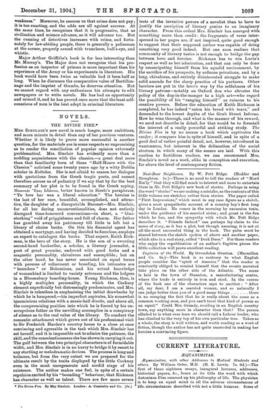MRS. SINCLAIR'S new novel is much longer, more ambitious, and
more minute in detail than any of her previous ventures. Whether it is likely to prove more successful is another question, for the materials are in some respects so unpromising as to render the conciliation of popular opinion extremely problematical. Mrs. Sinclair has evidently more than a nodding acquaintance with the classics,—a great deal more than that familiarity born of those "Half-Hours with the Classics" satirised some twenty years ago by a witty Dublin scholar in Sottabos. She is not afraid to season her dialogue with quotations from the Greek tragic poets, and cannot therefore accuse us of pedantry if we say that by far the best summary of her plot is to be found in the Greek saying, Movo -Elm; Uicrxis, better known in Steele's paraphrase, "To love her was a liberal education." The heroine is the last of her race, beautiful, accomplished, and attrac- tive, the daughter of a disreputable Baronet—Mrs. Sinclair, for all her daring unconventionalities, does not entirely disregard time-honoured conventions—in short, a " blue- stocking" void of priggishness and full of charm. Her father has gambled away his patrimony till little is left but a library of choice books. On this his financial agent has obtained a mortgage, and having decided to foreclose, employs an expert to catalogue the books. That expert, Keith Rick- man, is the hero of the story. He is the son of a sweating second-hand bookseller, a scholar, a literary journalist, a poet of great promise, endowed with good looks and a magnetic personality, chivalrous and susceptible ; but on the other hand, he has never associated on equal terms with persons of refinement or breeding, his intimates are " bounders " or Bohemians, and his actual knowledge of womankind is limited to variety actresses and the lodgers in a Bloomsbury boarding-house. Young Rickman, then, is a highly multiplex personality, in which the Cockney element superficially but distressingly predominates, and Mrs. Sinclair is relentless in emphasising the initial drawbacks by which he is hampered,--his imperfect aspirates, his somewhat ignominious relations with a music-hall dinette, and above all, the compromising position into which he is forced by his un- scrupulous father as the unwilling accomplice in a conspiracy of silence as to the real value of the library. To conduct the romantic attachment which grows out of his professional visit to Sir Frederick Harden's country house to a close at once convincing and agreeable is the task which Mrs. Sinclair has set herself, and it is impossible not to admire the patience, the skill, and the conscientiousness she has shown in carrying it out. The gulf between the two principal characters is of formidable width, and Mrs. Sinclair is in no hurry to bridge it by resort to any startling or melodramatic devices. The process is long and toilsome, but from the very outset we are prepared for the ultimate result by the traits displayed by the little Cockney even in the most unregenerate and sordid stage of his existence. The author makes one feel, in spite of a certain repulsion excited by his " bounding " behaviour, that Rickman has character as well as talent. There are few more severe • The Diving Biro. By May Sinclair, London: A. Constable and Co. [ea.] tests of the inventive powers of a novelist than to have to justify the ascription of literary genius to an imaginary character. From this ordeal Mrs. Sinclair has emerged with something more than credit : the fragments of verse inter- spersed in her pages are, if not inspired, quite good enough to suggest that their supposed author was capable of doing something very good indeed. But one soon realises that community of literary tastes is not enough to bridge the gap between hero and heroine. Rickman has to win Lucia's respect as well as her admiration, and that can only be done by emancipating himself from his squalid environment, by the sacrifice of his prospects, by arduous privations, and by a long, chivalrous, and entirely disinterested struggle to make solid amends for the sharp practice of his partners. Other barriers are put in the hero's way by the selfishness of his literary patrons—notably an Oxford don who elevates the policy of the dog-in-the-manger to a high art—who regard the possibility of his "ranging himself" as ruinous to his creative powers. Before the education of Keith Rickman is completed, he has indeed "eaten his bread with tears," and descended to the lowest depths of the Grub Street Inferno. How he wins through, and what is the manner of his reward, we need not describe in detail, for that would be to forestall the interest of a really powerful and striking study. The Divine Fire is by no means a book which captivates the reader; it conquers him in spite of himself, and in spite of a good deal of rather painful detail, not, however, introduced in wantonness, but inherent in the delineation of the social stratum in which many of the scenes are laid. With this caution to fastidious readers, we can recommend Mrs. Sinclair's novel as a work, alike in conception and execution, far above the level of contemporary fiction.


































 Previous page
Previous page